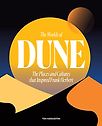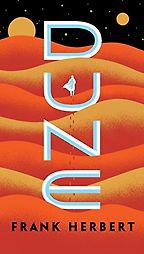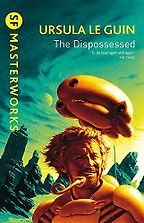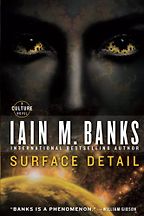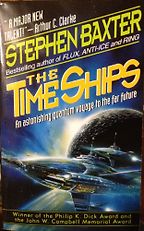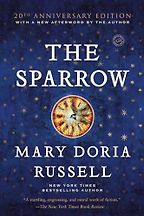I know you had trouble narrowing down to just five science fictional worlds. There are so many to choose from! What makes a really great sci fi world for you?
Something unexpected; something that I haven’t seen before. We see a lot of science fiction on TV and in films – certainly a lot more than there ever used to be – so it’s great to read a sci fi novel which offers a world that’s different to things we’ve seen on TV. That said, one of my choices today is Dune, which has been ripped off by so many films and TV series – the first and most obvious being Star Wars – that it now does feel familiar! But there’s enough in it, I think, that’s still unfamiliar – if nothing else, the immersiveness and the level of detail.
That’s one thing that I really love, actually; I’m not exactly a hard sci fi guy, but I love a world that feels like it has not just an imaginative reality but a scientific reality. In science fiction, that is – in fantasy I don’t need that level of detail. For instance, one of the books on my long list was the Mars Trilogy by Kim Stanley Robinson, which is as much about ecology, climate, landscape, terraforming and the development of science as it is about people and stories – maybe tipping slightly too far into that! Dune, I think, gets the balance just right.
So immersiveness and originality are the two things that I really love; if it draws me in and shows me something new, then I am on board. That said, I do just love spaceships – so you know, you don’t even have to do those things, as long as there’s a spaceship.
You’ve already mentioned your first book recommendation: Dune, by Frank Herbert. Could you introduce us to the sci fi world it portrays?
I’m guessing that most of your readers will know Dune – if only because it’s just been adapted into two enormously successful films. It’s the story of a young man, or boy really. When the story begins, he travels with his very powerful family to the planet Arrakis, known as Dune, which is entirely a desert world. He becomes involved not just in galactic politics, but in a struggle for freedom on behalf of the longest-inhabiting peoples of Arrakis, the Fremen, all centred around the production and ownership of a spice which allows space travel to be possible.
I’ve just written a book called The Worlds of Dune, which is subtitled ‘The places and cultures that inspired Frank Herbert’. Essentially, Herbert spent five or six years reading before and during the writing of Dune, and he took inspiration from a vast number of sources: historical, cultural, religious, personal. So The Worlds of Dune was about rounding up all of those many, many influences and trying to lay them out in an approachable and reader-friendly fashion.
“All of these novels are consciousness-expanding, or have been for me in one way or another”
It’s extraordinary – I think one of the reasons Dune has always been popular is the richness of its invented world. And part of the reason that world is so rich is because so much of it is drawn from history and culture, particularly Islamic and Native American. But also Greek myth, Roman history, Zen, Japanese culture… there are just so many. And of course his love of science fiction as well! All of this got poured into the pot, and it ends up being one of the most complex invented worlds in science fiction, and one of the most immersive as well.
How were you researching this? Did Herbert leave documentation?
Frank Herbert was a talker! He was a raconteur, and he loved to wax lyrical about his work and his ideas. He didn’t try to hide the places that he got his ideas from – for example, in Dune he lifts direct quotes from ecology books like Silent Spring by Rachel Carson. He pays direct homage to ideas of Zen bodily control, and he talked very openly about being inspired by the study of what was called general semantics, which was the idea that words and the way we speak them broadcast subtler meanings in addition to the obvious meaning of whatever we choose to say. That’s very important in Dune – the characters have the ability to use words in a way that can actually control another human being. And he was very open about the fact that this was derived from this now-overlooked area of general semantics, and imagining how that could develop 10,000 years in the future.
Researching the book was just a case of listening to and reading a lot of interviews with Frank Herbert; reading the wonderful book Dreamer of Dune that his son, Brian Herbert, wrote about him; and reading a lot of scholarly essays on Dune, of which there are many wonderful ones. Then researching the actual histories and ideas, and compiling all of that in a way which was readable to the layman – to me, essentially!
Related book recommendations: Books Like Dune
Your next writer is also famously very well versed in world cultures, as the daughter of two anthropologists – could you introduce us to the world of The Dispossessed by sci fi legend Ursula K. Le Guin?
I could have populated this entire list of five books with Ursula Le Guin novels! The Left Hand of Darkness, Rocannon’s World, and particularly the Word for World is Forest – which is the first of her adult novels that I read, and remains my favourite. I remember sitting in a screening of Avatar when I was working as a film critic and just thinking, “You’ve stolen everything!” The entire film felt like a rip-off of that one book! And then there’s her short stories, which have more ideas in them than most people’s novels.
The Dispossessed is as much a political and cultural thought experiment as it is a novel, though it is also extremely entertaining to read and moves really nicely, with characters that you really relate to. It’s about two worlds, a planet and its moon. One is a society very much like our own, patriarchal and capitalist, and constantly various parts of it are at war with various other parts of it. And on the moon, colonists from the first world have seceded to set up their own anarchist, entirely equal society. Everyone is free to explore their own interests and ideas, as long as they spend time giving back to and supporting the society as a whole – so there’s an element of commune ideals. She was exploring the anarchic ideas that were swirling around when she was writing the book – in 1974, so these ideas had been around in the ether for seven or eight years – well, longer obviously, but in the wider culture. The Dispossessed is about taking this political concept and picking it apart forensically: what exactly would life be like, if we could do it – if we were living in an anarcho-syndicalist world? Would it work? Would everyone be on board? The cynics would obviously say no, it would fall apart immediately. Ursula Le Guin is much more intelligent than that. Neither world is inherently good; neither world is inherently bad. It’s just about exploring the differences between them.
It links back to Dune in a really interesting way: the Fremen, though they have certain power structures, are essentially anarchists, and they live by their wits, by whatever they can scavenge and grow. And the Sietches are very commune-ish, though he was actually writing before that idea became big. So I think the two books have a fair bit in common. Le Guin must have read Dune – everyone must have by 1974 if they were working in science fiction. Whether she approved of it, I don’t know. I mean, Le Guin is smarter than any of us. And as wonderfully intelligent and thoughtful and self-made as Frank Herbert was, I think Le Guin goes deeper into the areas that she finds interesting, and her work cuts deeper. But Dune is more entertaining! So it’s six of one and half a dozen of the other.
It’s interesting to me that Le Guin sets this society on a moon, but the fact that it’s a moon is more or less irrelevant – it’s not about space settlement.
Yes, absolutely! It could just be another country almost. The world building is quite subtle in The Dispossessed, as it is in Dune in a funny sort of way – in both it’s quite light touch. You don’t get descriptions of spacecraft and of futuristic feeling cities, etcetera. In Dune the great antagonists are the Harkonnen, and their world of Giedi Prime is a key location – and we know almost nothing about it. We know that it’s dirty, and we know that it’s oppressed, but for actually visualising it we’re left completely to our own imaginations. The Dispossessed is quite like that as well. The world building takes place internally, almost; the worlds are being built inside the characters, and in their experiences and their politics, their emotions and their ideas. That’s where the big world building stuff happens.
Could you introduce us to your next choice: Surface Detail by Iain M. Banks, part of the Culture series? What impressed you about this particular sci fi world?
I read all of the Culture novels back-to-back, and this was the one that I had the most vivid and guttural reaction to. I found it really intense. It’s an extraordinary novel: absolutely terrifying, and really upsetting in many ways, in a similar way to one of the other books on my list – The Sparrow.
It is set in the Culture, which is a vast Galaxy-spanning civilization, and is essentially benign – as in, its non-invasive to other species. Everyone lives for a very long time, there’s a lot of human-AI interaction, and it’s very stable. Not quite utopian, but close to a utopian future. But the story that Surface Detail tells is about a war taking place in virtual reality, the outcome of which will decide whether societies within the Culture are allowed to create their own hell. There are civilizations which have been creating their own hells within virtual reality, and consigning the consciousnesses of people who are deemed to deserve it – criminals, essentially – to these hells after their death, to spend eternity in torment. But obviously, as we know from our own world, people are condemned unfairly. So there’s now a debate across the galaxy as to whether the entire concept of these artificial hells should be allowed to continue. One of the characters in the story is attempting to break this virtual reality war, this proxy war, out of the virtual space and into reality – where it will have real consequences.
It’s a story about how meaningful religion still is in a technological universe, and abut cultural difference, and it’s also definitely about capital punishment – and there’s never really any doubt as to which side Banks is on. And it’s also just a ludicrously readable story, because it’s constantly opening up kind of new vistas of ideas and worlds. Parts of it are set in various hells which are genuinely disturbing and unpleasant, and it’s about characters trapped in there who don’t believe that they ought to be. It’s the kind of novel where the bottom keeps dropping out of it, and you fall into something more shocking and wild and mind-expanding than you already thought you were in – as with many of his books, actually. There’s another one called Matter, which is very similar. I just don’t understand how it’s possible for him to have created such a body of work, particularly in such a short time – and alongside another entirely separate body of work! It’s completely bonkers! Even though not all of them are books I adore, they all have so many ideas, and it’s wild.
I guess what Banks was doing, to some extent, is taking the kind of idea that Le Guin would write a short story about, and extrapolating and extrapolating and extrapolating, so they just get bigger and bigger and bigger, and ideas pile up on ideas. It’s a creative process of accretion – like the literal building of worlds, when planets form, they spin faster and faster and draw more and more matter into themselves. I find the process of forming a novel to be like that anyway: you have an initial idea, and it starts to spin in your head, and then other things kind of clump to it.
Surface Detail came out in 2010, and we’ve had a heyday of writing about artificial intelligence since then, but this still feels like a very unique take.
It’s really an intense experience. It’s just so very visceral. And it’s a horror novel in the most literal sense, because it’s about people being consigned for eternity to absolutely horrific torment. There is nothing more upsetting than that! But there’s a rip-roaring war story going on in parallel. It’s really quite something, and I definitely need to read it again.
Tell us about the world constructed within your next sci fi book recommendation: The Time Ships by Stephen Baxter.
The Time Ships was written for the centenary of H. G. Wells’ The Time Machine. I’m generally suspicious of sequels and prequels to classic books being written by modern authors, but in this case it really works. His idea was that when Wells was writing, he was drawing on what was, at the time, the most cutting-edge scientific, cultural and sociological ideas going, for the creation of his future. And he takes that idea and runs with it.
In The Time Ships, the time traveller from Wells’ novel has returned to London in 1895, but begins to feel guilty about having left behind the Eloi girl who trusted him. So he attempts to travel once more into the future, but discovers that his actions – the very existence of him and his time machine – have altered the future, and she no longer exists in the timeline in which he travels. So instead, he travels to a human future where humanity has built what’s called a Dyson sphere – a theoretical object posed by an American scientist called Freeman Dyson, which is a way of harnessing every single atom of energy from the sun. It’s a complete sphere, which goes around the sun, and on the inside of it is a vast world. It’s been built just inside the orbit of Mercury. On the underside of this sphere is a society of technological creatures that keep the sphere running, and on the inside is a less technologically advanced human society. So it’s similar to Wells’ world of Eloi and Morlocks.
He travels back hoping to get home and ends up in a kind of domed London in the 1940s, which is still fighting the First World War; and then he goes back to the Palaeocene era; and then he comes back… it’s one of those stories which just gets bigger and bigger. I think it was the first novel that I read which extrapolated on scientific ideas to this galactic degree: the ramifications of his actions become bigger and bigger and echo out. It’s not just, ‘he kills his own dad and he’s never born,’ that basic time travel stuff. After I read it, I encountered Olaf Stapledon’s First and Last Man and books like that, which I now realise were a huge influence on The Time Ships and do a lot of the same things that Baxter was doing – but I love that book partly because it’s the first of that type that I read. The Three Body Problem is another very similar idea, in that it’s starting from first contact with aliens, but then extrapolating the problems of two little worlds in a vast universe, out to universal galactic proportions covering all of time and space.
I also love The Time Ships because it’s written in what could have been quite a hokey Wells-apeing style, from the perspective of a Victorian gentleman – which could have been very cheesy, but actually grounds the ideas really nicely. He’s a character that you can relate to. In a lot of these stories, particularly in Stapledon, they go off so far into the ether that you feel a bit lost in the vast universe – as so many of us do on such a regular basis! But in The Time Ships, because he’s writing from the perspective of a slightly baffled and confused Victorian gent, it always feels like we know where we are in the story.
It’s interesting that you mention that. When you said he was bringing scientific ideas up to date, and mentioned the enormously complicated The Three Body Problem, I was thinking what a tough translation job is facing sci fi writers today who want to be scientifically up to date – it’s so much more conceptually counter-intuitive than anything Wells would have had to deal with.
Yeah! I recently read The Vanished Birds by Simon Jimenez, where everyone’s flying around on wooden ships, essentially, from planet to planet. I think if I was to write a sci fi novel – I mean, FloodWorld, my children’s trilogy, is essentially science fiction, but it doesn’t really go close to any kind of quantum theory – if I was going to write an interplanetary sci fi, I would be very attracted to the idea of bringing things quite back to basics. I’ve always been fascinated by the idea that the original Alien III was supposed to be set on a manmade wooden planet. I really love those kinds of ideas. I don’t have the brain power or the scientific background to start thinking about quantum theory, except in a glib Ant Man way – and there’s quite enough of that going on at the moment as there is!
Let’s talk about your last choice: tell us about the world of The Sparrow by Mary Doria Russell, the first book of a sci fi duology.
This is probably the only science fiction I’ve read that was even more upsetting than Surface Detail. It’s about the perils of exploration and exploitation, and misunderstanding other cultures. The world receives a broadcast from another planet, and it’s incredibly beautiful, otherworldly music. The assumption is immediately made that this is a beautiful peaceful society, and the first group of earth people who are able to afford and mount an expedition to this other world is the Catholic Church. So, as they did in the 14th and 15th centuries, they get a bunch of priests together and set off – if not to convert, then at least to converse with this alien species.
They land on the other planet after a long voyage, and they discover that on this world, there are two separate races. One is agrarian and soft and peaceful, and the other is highly, highly intelligent, highly artistic, highly cultured – and preys for food on the softer, more agrarian species. Obviously, the group from Earth are horrified and shocked by this, and various things that they do and cultural misunderstandings that they have result in slaughters and horrific, outcomes. From the beginning, you’re being told the story in flashback from the one character who survived. His body has been taken apart, and so has his mind, and it’s his memories of what has happened – and I won’t spoil it for people who haven’t read it, but the full revelation of what’s happened is genuinely shocking and unpleasant. And deeply moving.
She writes really, really beautifully about horrible things. You know, I find I’m surprised at myself that I’ve chosen two such upsetting books on this list, because I’m not someone who likes particularly nasty stuff! But The Sparrow is so empathetic in its treatment of its characters. It’s very much about the way the church behaved in South America, and the ramifications of that which continue today; but it’s also about what religion means in a technological universe, and about misunderstanding other cultures and making judgments about them based on our own moralities – and asking, is there an essential morality?
I have a family member who is a Christian – I’m not myself, I’m entirely agnostic – and this is his favourite novel, even though I think it is very questioning of the Church, particularly the established Church. And of religion in general. The name comes from the Biblical line about His eyes on the sparrow, about God watching over everything; but does a human god also keep his eye on other cultures? That’s always one of the big questions in sci fi. But it’s also apparently something that appeals to someone who is a true believer, so I find that really interesting.
It’s a book that seemed to be everywhere 10 or 15 years ago but doesn’t seem to be talked about very much anymore, which is strange. She never followed up – she worked on those two science fiction novels, and then she turned to historical fiction and stayed there. And it never got adapted, and never will, I don’t think! The first half of the book is very adaptable – you could make a cracking HBO series out of it. But the second half is just too bleak.
I strongly encourage people to read the book. It’s one of those books that expanded my consciousness and my horizons when I read it, in my early 20s. All of these novels are consciousness-expanding, or have been for me in one way or another: The Dispossessed opened my eyes to ideas about other ways of living and anarchism, many of which I’d been introduced to as a kid, but it clarified them for me. Dune introduced me to ideas of story, ideas about storytelling and unpicking your own stories, and anti-storytelling almost; and also it was one of the first science fiction novels I ever read, so it introduced me to the whole idea of interplanetary science fiction. Surface Detail introduced the idea of expanding and extrapolating your ideas, and making them bigger and bigger and bigger… I really like a sci fi novel that is consciousness-expanding.
I really like just a good tale as well – one of the books on my long list was Leviathan Wakes by James S. A. Corey, the first of the Expanse series. Those books are just cracking science fiction novels that introduce a really well-thought-out future in a straightforward and approachable way. I also had The Forever War by Joe Haldeman on my long list, which is again relatively straightforward in its world building but tells a really good story. But I guess for this list, I chose the worlds that felt like they were opening up my mind.
Interview by Sylvia Bishop
April 16, 2024. Updated: September 26, 2024
Five Books aims to keep its book recommendations and interviews up to date. If you are the interviewee and would like to update your choice of books (or even just what you say about them) please email us at [email protected]
Five Books interviews are expensive to produce. If you've enjoyed this interview, please support us by donating a small amount.

